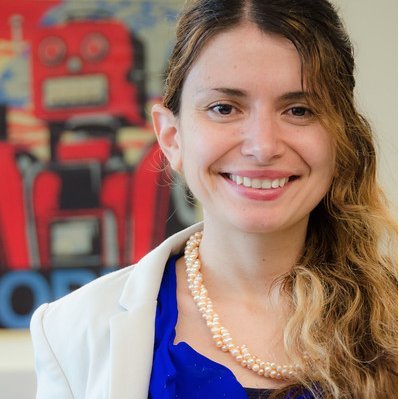
EAAMO colloquium SERIES
Upcoming Events

Hilary Faxon: "Small Farmers, Big Tech: rural livelihoods and networked protest in Myanmar"
While much social science to date on the digitization of agriculture has focused on large agribusiness, farms under two hectares account for 84% of farms worldwide and produce about 35% of the world's food. Many small farmers are located in the Global South, where land provides a source of sustenance and site of home. Understanding the implications of increasing digital connection is critical for understanding rural economies, societies, and politics. This talk draws on a decade of anthropological and participatory research with farmers, activists and policymakers in Myanmar to discuss how digital connection is shifting rural economics, culture, and politics, before and after the 2021 military coup.

Aurelio Nuño Mayer: "The Hidden Paradox of Education and Democracy: The Politics of Mobilization, Educational Quality, and Liberty"
Aurelio Nuño Mayer is a Visiting Scholar at Harvard University and the Former Minister of Public Education in Mexico (August 2015 to December 2017). Aurelio Nuño received a degree in political science and administration at the Universidad Iberoamericana, and he later earned a master's degree at University of Oxford (UK). He articulated one of the most comprehensive and ambitious education reforms in many decades in Mexico. The reform consisted of five structural changes: 1) a new national curriculum for the Twenty-First Century skills; 2) a new merit-based professional system for training, hiring and promoting teachers; 3) a new model of school organization; 4) a national strategy for inclusion and equity; and 5) a new model of governance within the education system. Currently, he is a visiting scholar at the Harvard Graduate School of Education and he is writing a book on the politics of education.

Ruchit Nagar: "Unlocking Precision Public Health in Rajasthan, India"
Public health in India is undergoing a digital transformation. Community health workers, newly equipped with smartphones, are now reporting beneficiary-level data with village level granularity, in real-time. This talk will explore how Khushi Baby, the technical support partner to the Department of Health in Rajasthan, India, and collaborators, are using this new big data, from over 70K community health workers, to drive insights at the beneficiary, health-worker, and community level.

Mohammad Akbarpour
Economists typically prescribe prices for guiding the allocation of scarce resources, arguing that the implicit selectivity of the price system helps allocate resources to those who value them the most. However, in many contexts, considerations such as fairness, equity, or consumption externalities provide arguments against using prices—and indeed, many ethicists and policy-makers opt for schemes that allocate resources free of charge to certain selected groups. The price system, they argue, directs resources to those who are able to pay the most, which may not match up with true needs or moral desert. The question of whether to use prices or priorities played out in the context of allocating vaccines during the Covid-19 pandemic. Although prices could help identify individuals with the highest private values for vaccines, most countries opted for a priority system with rationing. This paper derives the optimal scheme from economic primitives. The key insight is that while social considerations may indeed limit the role that prices play in the optimal mechanism, they are typically not sufficient to rule out prices completely. As a result, a priority system with rationing may coexist with a pricing scheme; such a hybrid mechanism allows the designer to leverage observable information while simultaneously screening for unobservable characteristics.
Past Events
Recent talks
Medium Article - Dr. Lisa Cook
“Can mobile money be used to more efficiently and equitably distribute emergency funds to families affected by the COVID-19 economic crisis?”
Medium Article - Professor Bistra Dilkina

































